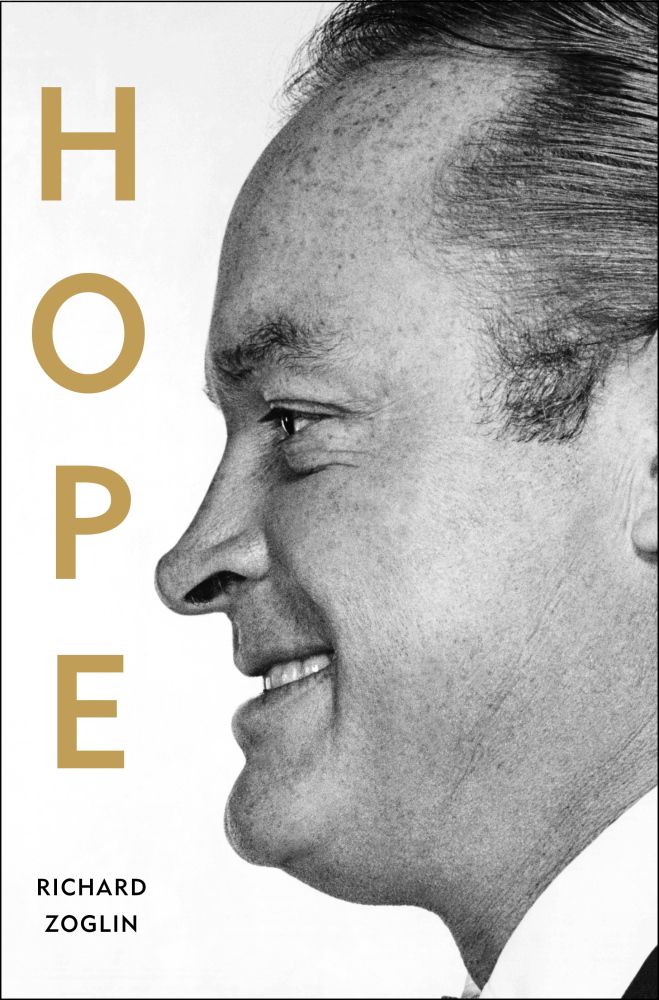In 2013, a writer in Miami was writing about Bob Hope and said if you’re under 40, you’re probably wondering who he is.
Offering an explanation, the writer said, “Hope was a movie star during your grandparents’ days … known for his comedy films, entertaining American troops overseas with the USO, his many homes and his parade of extramarital affairs. He died back in 2003 at 100 years old.”
Too short and too mean. But cracks like that make Richard Zoglin’s new book “Hope: Entertainer of the Century” important. A contributing editor and theater critic for Time magazine, Zoglin has put together a fair-minded book about Hope as an entertainer and as a person, and tells a far more compelling story than can be found in some tossed-off snark. Don’t just ask your grandparents. Read Zoglin.
Hope’s flaws, such as his womanizing (Hope was unfaithful to his wife, Dolores, even into his 80s), are all detailed in Zoglin’s book. There are also comments about the stresses in his relationships with frequent co-star Bing Crosby and with Johnny Carson (who disliked the way Hope would derail Carson’s “Tonight Show” to promote the latest Hope special), his shortcomings as a father, his demanding treatment of his writers and his workaholic ways long after his physical limitations should have sent him offstage.
Indeed, Zoglin says Hope’s reputation was in decline before he died, that he had lost younger audiences not only with his conservative politics but also with an act that showed him as “a cue-card-reading antique.” Hope, says Zoglin, “had, unfortunately, stuck around too long.”
But pause a moment and take a look at the book’s title. Zoglin’s biography is, in fact, an extended argument for Hope’s greatness. After all, he conquered every entertainment medium of his times, from vaudeville to Broadway to radio, movies and television. He essentially invented the modern comedic monologue – sharply paced and full of modern references – which his professional heirs use to this day.
And beyond such achievements, Zoglin says Hope redefined celebrity. Hope personified the star as career-controlling businessman, whether cutting tough deals for movie and TV contracts or by being a successful investor in California real estate.
His entertaining troops in war zones “showed by example that Hollywood stars … can give back, do good, use their fame to make an impact in the public arena.” There’s even a humanitarian award named for Hope.
Zoglin also talks about Hope as an inspiring figure, one who constantly received letters from people who saw in his work someone they could connect to, even share bits of their sorrow and misfortune. Hope made sure the letters were answered, sometimes through his assistants, often by Hope himself.
All of this unfolds in considerable detail. Zoglin has read Hope’s biographers, looked closely at his memoirs (suspect and ghostwritten though they are), and combed through Hope’s papers with the approval and help of Bob’s daughter, Linda. He has seen the films and studied the TV specials, admiring where it is called for, pointed where it is not.
Ample space is devoted to Hope’s youth in Cleveland, and the difficulty of it, with a hard-drinking father who was often out of work. But he goes deeper than some biographies, reporting that Hope’s dropping out of high school “for reasons that Hope and his biographers have always been vague about” was in fact the result of his being sent to a reform school in Lancaster, Ohio, for seven months after being judged a delinquent.
Yet what you should take away is the idea that Hope still matters. Sure, he went long past the days when, as Zoglin notes, Hope was a hip star with a young following. But he left a huge mark on entertainment and America.
Considering the relationship between Hope and Crosby, Zoglin says, “Crosby was arguably the greater artist. But Hope was more driven, more responsive to the changing entertainment landscape, and, in the end, had a broader and more lasting impact on the world of show business. He simply tried harder.”
Send questions/comments to the editors.



Comments are no longer available on this story